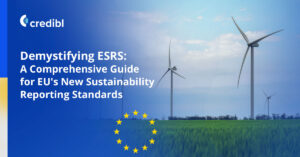In recent years, ESG and Sustainability Reporting have become increasingly important for organizations across various industries. In this blog post, we will discuss key differences between ESG and sustainability reporting and the importance of prioritizing both for the success of the organization.
ESG Reporting:
ESG reporting has an ever-increasing demand from investors and stakeholders who are looking to assess a company’s performance beyond just financial metrics. According to a study by MSCI, companies with strong ESG scores outperformed those with weak ESG reporting by an average of 7.7% per year between 2007 and 2018.
Sustainability Reporting:
Sustainability reporting focuses on ensuring the company’s long-term environmental and economic sustainability. These include measures like reducing energy and water usage, managing waste and emissions, and implementing sustainable supply chain reporting. A study by Harvard Business School found that companies with a strong sustainability impact had a 4.8% higher return on assets and a 0.8% higher profit margin compared to those with a weaker impact.
The Key Differences Between ESG and Sustainability Reporting:
While both ESG and sustainability are concerned with environmental, social, and governance factors, ESG focuses on Environmental, Social, and Governance reporting that assesses a company’s impact on the environment and society. On the other hand, sustainability focuses on a broader principle ensuring a company’s long-term environmental, ethical, and economic sustainability in a holistic manner.
While ESG and sustainability are related, they have various key differences.
Focus and Scope:
ESG reporting is focused on the impact of a company’s operations on stakeholders and the environment, while sustainability reporting focuses on long-term environmental sustainability. ESG reporting captures the social and governance aspects of a company’s operations, while sustainability reporting prioritizes environmental sustainability.
Measurement:
ESG reporting is often calculated with carbon emissions, workplace diversity, and executive compensation metrics. In contrast, sustainability impact is primarily measured using metrics such as water and energy usage, greenhouse gas emissions, and waste management.
Stakeholders:
ESG reporting is usually of interest to investors and shareholders who are looking to assess a company’s performance beyond just financial metrics. Sustainability reporting, however, appeals to a broader range of stakeholders, including customers, employees, and the wider community.
Conclusion:
Companies need to prioritize both ESG and sustainability reporting for long-term success. While ESG reporting focuses on the impact of a company’s operations on stakeholders and the environment, sustainability practices focus on ensuring a company’s long-term environmental and economic sustainability.
Using ESG and sustainability goals in tandem, companies can ensure a positive impact on society and the environment while also creating economic benefits through cost savings and improved reputation. As the importance of ESG and sustainability reporting continues growing, companies prioritizing this reporting will be better positioned for long-term success.







